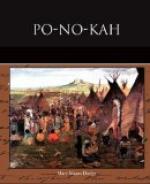The children saw him no more for weeks. Rudolph remembered his parting words, and though he could not fully understand Po-no-kah’s motive, he faithfully obeyed his command. Not even to Tom did he relate what had occurred.
IX.
INDIAN LIFE.
Rudolph and Kitty learned many things from the Indians that they never would have studied in the rough school-house near their pretty home; and they soon became familiar with many singular customs that at first filled them with wonder.
For instance: when they, or any of the little papooses, were naughty or disobedient, they were put under what might be called the water-cure treatment. Instead of being whipped or locked up in a dark pantry—as was, I am sorry to say, the custom among some white people—they were simply “ducked” under water until they became manageable. Winter or summer, it was all the same. A bad child would very soon become a wet child, if there were any water within a mile.
There are bright sides, as well as dark, to the Indian character; and in considering their cruelties and inhuman practices, we must remember that the white man has not always been just to him or set a good example to his uncivilized brother, or been careful not to provoke him to deeds of resentment and wrong. An Indian rarely forgets a kindness, and he never tells a lie. He is heroic, and deems it beneath a man’s dignity to exhibit the slightest sign of pain under any circumstances. Among the Sioux tribe of that time, the boys were trained from the first to bear as much hardship as possible. They had a ceremony called the Straw Dance, in which children were forced to maintain a stately and measured step, while bunches of loose straws tied to their naked bodies were lighted and allowed to burn slowly away. Any poor little creature who flinched or “broke step” was sorely punished and held in disgrace.
There were certain dances among the Indians performed by the warriors, before going either to battle or to the hunt. If to battle, they spent hours, and often whole days and nights together, in the fearful war-dance, accompanied by clashing on their drumlike instruments, and whoops that rang long and loud amid the echoing hills. If to the hunt, the Bear-Dance or the Buffalo-Dance was kept up nights and days before starting, in order to propitiate the Bear Spirit or Buffalo Spirit, whichever it might be. They had a funeral dance also, which was very solemn and impressive. And if a chieftain was to be buried, either in the river, or, as among the Mandans, on a rough platform erected on poles high up from the ground, the warriors danced before his wigwam, and assigned to a few of their number the duty of seeing that his widow and children, if he left any, should never be without food and shelter.
Kitty and Rudolph often looked on with, mingled feelings of terror and delight, while some of these strange ceremonies were being enacted. It was curious to see the stalwart warriors, with bent backs and glum faces, and many a grunt or whoop, stamp through the measured dance. Often Kitty would clutch her brother’s arm in terror, when, in strange concert, the savages would suddenly halt, and with fiendish look and stealthy gesture, seem to be listening to the approach of an enemy.




